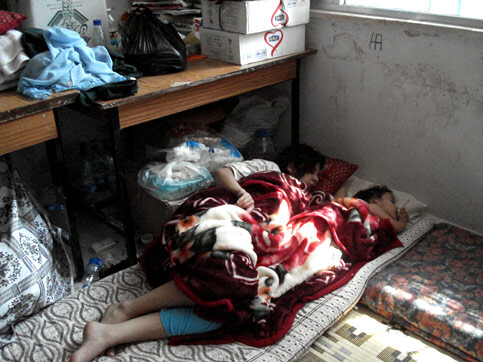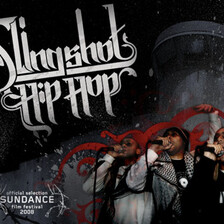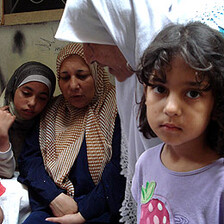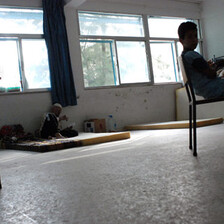Baddawi Refugee Camp 25 May 2007

Displaced children from Nahr al-Bared refugee camp sleep in an UNRWA school in Bedaoui camp. (Image courtesy of Marcy Newman)
We went to the Badaoui Camp as part of an ad-hoc grassroots relief group for Nahr al-Bared refugees. (See: http://nahrelbareddonations.blogspot.com) While there, we interviewed people on the street and medical officials to understand both the situation in Nahr al-Bared and the now increasing difficulties in the Badaoui camp.
Our first set of interviews while Jackson and I were walking on the street on 24 May 2007. We decided to interview a group of women approaching us at this busy (and typical) intersection.
On the street
Ghalee Krayaam: We are from Nahr al-Bared. All of us are from Nahr el Bared. My son was hit and is critically injured. We brought him to the [Palestinian] Red Crescent. Now, we’ve taken him to the Zgharta Hospital in an ambulance. They weren’t able to do anything for him here. The bullet hit him in the thigh.
Question: When did you leave Nahr al-Bared? Could you describe the situation?
G. Krayaam: We left yesterday. What can I say? The fighting wasn’t against Fateh al-Islam. The fighting was against our homes. Our homes were destroyed. If you were to go inside the camp, and see the camp for yourself, you would say the same. No homes [are] left. The homes on the extremity of the camp have all been destroyed. People left the extremity of the camp and went into the center of the camp, and the bombing followed them. We, in the center of the camp, received two bombs on our home. Our son was hit. He was inside the house. He is 27 years old. He was hit while in the center of the house. God knows, he was inside the house. Now, he is on his way to the Zgharta Hospital.
Question: And you came here to the Badaoui Camp?
G. Krayaam: We came here to Badaoui. [We are] 42 people. I swear to God, we slept on the floor. I swear to God Almighty, we slept on the floor.
Man interrupting the conversation: What good is what you’re saying? Why are you saying it? What good will it serve?
G. Krayaam: What am I saying? We’re saying what happened to us. I swear to God, we slept on the floor.
Man: The media and the International Red Crescent all took pictures and they did nothing. Nothing has happened. Yesterday, at 11 pm, we got two bottles of water. Yesterday evening, we got three sandwiches for a large family. Six people had to share three small sandwiches.
G. Krayaam: I have three children and daughters-in-law and their husbands and their children. We all slept on the floor. Do you need more than for me to swear to God? We have only God.
Nawal Hamed, another woman begins commenting: This is a shame. We are living each day by day. This is not a life. How could they remove us from our homes? If we were still in our homes, at least we [would have had] oil and salt.
[A third woman comments, Woman 3]: On what basis did the army open the roads to have us leave? On what basis, did they open the roads?
We are a poor people. I am a widow. My husband is a martyr. What kind of a life is this?
N. Hamed: We are a poor people. I am a widow. My husband is a martyr. What kind of a life is this? How can we live like this? I do not know. Me, and my sister, and our children and my brother’s children — we are 30 people in a house with two rooms. God had mercy on us and found these people to shelter us in their homes. We are guests. They may accept us for one day or two days but for how long?
Abu Mustafa, enters the conversation: You are not staying in a camp. You are staying with your people. You are not staying with strangers.
N. Hamed: People cannot withstand this. My nephew was saying, ‘how could we have left our home. I’m going to shoot myself. I can’t take it.’ The youth can’t withstand us. He says, ‘oh aunt, I’d rather have shot myself than come here.’ He tears my heart. (Literally, she said, ‘he burns my heart with fire.’)
Question: Let us go back in history. If you can tell us, where did you come from Palestine and how did you get to be here?
N. Hamed: They are the cause. They are the primary cause. The Israelis. They made us into refugees and displaced us from our homes. We became refugees in Lebanon. The Lebanese are also our people. My father was 12 years of age when he came here from Palestine. He married here and had children. I am the eldest. [But] is this possible? Is this allowable? How many displacements can we withstand? We, the Palestinian people, what have we done? We fast; we pray; we fear God. What have we done? I swear, we don’t hurt anyone. We and the Lebanese people are family. My Lebanese friends are like sisters. From the Hallak family. From the Sayed family. The families around us in Mahmara are like family. We are family with the Lebanese. Why is this happening to us? What guilt did we do? What crime did we commit? They were foreigners who came to our camp.
N. Hamed: This is impossible, sister, what is happening is incomprehensible. We have been slaughtered. We can’t withstand it anymore. My heart is breaking [literally: my blood is burning] over my nephews and nieces.
Abu Mustafa, interrupting: This is a conspiracy by the Arab leaders against the Palestinian people.
N. Hamed: And this is my daughter. And this is my niece. And this is my aunt, my father’s wife. My mother died when we were young. We have such a distressing situation, sister. I swear to God, we haven’t found anything to eat. Shall I say this? I swear to God — we haven’t found anything to eat.
Question: What about the aid you’re receiving?
N. Hamed: I swear to God, we, ourselves, we haven’t received anything.
Another man joins the conversation, interrupting [Man X]: There is a wait. They are distributing to the schools. There are people responsible for the aid distribution. Maybe, you haven’t received anything yet. Ask and you’ll get.
Question: Is the aid getting only to people in the schools?
Omar Sleiman [new to the conversation]: Let me give you an example. I am staying a bit outside the camp. [I am not staying] in the center of the camp. I am receiving nothing. I am running here [to the center of the camp] to get something to eat. And it is food that we need. Clothes, we wash the clothes that we wear during the day and wear it again the next day, but don’t we need to eat? I have three children, and I have a girl who is 10 months old. Leave it God, sister, what can we do?
N. Hamed: I need this medicine [pointing to a prescription and an empty box of medicinal tablets]. It costs 50,000 Lebanese Lira [approximately $33]. Where can I get 50,000 LL to pay for it? Let me see if the International Red Crescent can provide it to for me? I need to take it for three months and it is finished now.
Man X: There are many stories like her story, and her story is easy relative to others. There are people who need medicine that costs 100,000 LL. They have heart problems. There are many other chronic illnesses. We are a camp, and a camp with many illnesses. Where are people going to get the money to purchase these medicines to be cured? What can we do? What then?
N. Hamed: We are a poor people. What have they done to us? This is what I don’t understand. Our house is three stories. Each floor is two rooms, and each room is filled.
O. Sleiman, responding to N. Hamed: The buildings can be rebuilt. We can get the money. The most important thing is our safety. But what about our lives? What about our children?
N. Hamed: Due to poverty, we are 10 in a room. We are a poor people.
O. Sleiman: That isn’t important. What is important is that we are in safe health and that this situation ends.
N. Hamed: What is important is that we return to our homes. That is all we want from you. We’ll eat bread and onion. Just let us return to our homes.
On the street - 2
Abu Mustafa: Look at the children. How many children left from Nahr al-Bared? How many are in need of milk? How many are in need of breastfeeding? Don’t you need a mother who is strong enough to be able to breastfeed her daughter or son? The women aren’t [healthy] enough. All we can do is provide bread and water for the children.
Question: People are saying that Fateh al-Islam has been in Nahr al-Bared for five months. Did you have any interaction with them? Who are these men?
Omar Sleiman: Nobody knows anything about them. Let me tell you something, sister. A hive of wasps, can you put your hand in the midst of a hive of wasps? There you go — that’s the answer.
Abu Rabieh enters the conversation: We don’t want any political talk. We don’t want to say things that are inaccurate. We don’t want to harm anyone with our words or our actions. The conversations that are inaccurate or wrong, we don’t want them. If you want to do an interview, go interview people who are figures in the community. We are common people. We cannot offer analysis. We cannot speak or judge on these issues.
Question: But your voices are important.
This is a conspiracy that is being forced upon the Lebanese people and the Palestinian people
Abu Rabieh: No, our voices are not important. This is a conspiracy that is being forced upon the Lebanese people and the Palestinian people. Conspiracy. Conspiracy. Conspiracy. We cannot, we cannot [do anything]. And there is a politicized media that comes in here and conducts interviews. And these youth, these people, start speaking nonsense [literally, ‘messing their words’], and this shouldn’t happen. So, we, I, plead with you, if you want to do interviews, do interviews with people who can comment. This is my personal opinion. But, we, the common people, we cannot give comments that could be misunderstood. Let’s say someone insults [assassinated former Lebanese Prime Minister Rafiq] Hariri. Can we accept an insult on Hariri? No. [Or what if someone] insulted [Lebanese Prime Minister] Siniora? Can we accept it? No. [What if] he insulted someone else? No. This is improper. It should not happen. And then [the media] would say that the Palestinian people, as a whole, are insulting this person or that person. So, I ask you, if you want to do an interview, do it with select individuals. They can give you their political analyses of what is happening. This is my personal opinion.
Question: This is what is happening.
Abu Rabieh: Yes, but people are emotional and there is a politicized media so we have to be careful. We cannot make generalizations.
Abu Rabieh: The bottom line: This is a conspiracy against the Palestinian and Lebanese people.
Interview with Palestinian Red Crescent official
Question: Please identify yourself and please explain what your position is here in Badaoui.
M. Rashid: Mahmoud Rashid. [I am the] manager of the administration of the Saffad Hospital in Badaoui Camp. At the start of the events, I was following the situation from a medical perspective from within the Nahr al-Bared camp.
Question: What did you see from within Nahr al-Bared camp, as medical problems and as humanitarian problems?
M. Rashid: From a medical angle, there were no capacities for surgeries. There was one center that was able to handle certain situations but [not] the bigger problems; there were no capacities to conduct surgeries. And the doctors that were available in the region, they had to work within the limited capacities. In coordination with the governmental agencies, we were able to have our only car enter the camp [referring to Nahr al-Bared].
Question: Which day of the attacks was this? First day? Second day?
M. Rashid: Second day. We entered Nahr al-Bared on the second day.
Question: And was your entrance easy; was it difficult?
M. Rashid: It did entail some danger. But we entered. They allowed only one car to enter. [The ambulance was able to remove] some of the wounded — 10 wounded in the first day. And [we] brought in some very basic medical supplies. [The second time the ambulance entered the camp], we brought some basic foods, some bread. But the provisions that we brought in were insufficient for 30,000 people.
Question: So what did they see in their entering and their leaving the camp?
M. Rashid: I was in the camp. I was in the camp. There was destruction.
Question: You are talking about destruction. Could you describe the destruction?
Rashid: It is beyond description. There is destruction. You cannot move from the attacks. I had difficulty moving around to report the injuries to the administration [of the Palestinian Red Crescent]. There is a lack of water in the camp.
Question: Was the camp suffering from a lack of water before the attacks or as a consequence of the attacks?
M. Rashid: No, due to the attacks. The water pumps were available before. UNRWA provides the camp with water pumps. The electricity was cut off at the start of the attacks. Consequently, there was no ability to retrieve the water. There [also] became a besiegement of the camps. The size of the camp is 1 km2 and no one could leave or enter. People started to adapt with what they hand. Sometimes a room would have 30 or 40 people and they would have to make do. A few basic provisions were allowed in — bread and water — but it was still insufficient.
Question: From your perspective as medical agents, have you been able to put pressure on the Lebanese government and the Lebanese army to limit the bombardment if not call for a ceasefire?
M. Rashid: With regards to the Lebanese decision makers, we cannot enter the camp without their approval. We cannot enter without full coordination from them.
Question: How is this coordination offered? Has it been difficult to get this approval?
M. Rashid: Basically, there have been some simple easements to get approval. We cannot get a truckload of provisions, but we can get an ambulance to come in with some medicine and some food. And we were able to remove the handicapped and the ill and the elderly.
Question: Were you able to remove the injured?
M. Rashid: When we call them and get them to meet us at a specific location, then we could get them out.
Question: In your opinion, what is the number of people who remain in Nahr al-Bared?
M. Rashid: I have no clear number. Perhaps half of the camp population remains in the camp.
Question: The camp we’re in now, Badaoui, before the refugees arrived from Nahr elBared, what was the size of this camp?
M. Rashid: Between 12,000 to 15,000.
Question: So, how is the situation now of provisions to the refugees?
M. Rashid: It needs greater energy. There is a lack of quick response to the situation. We are coordinating. We are talking with national and international agencies, and urging them to respond quicker. Ten thousand people left within two days — it requires quick response and a lot of capacity.
Question: These 10,000 people, where are they staying?
M. Rashid: They are staying at schools, at kindergartens, some with relatives and family with friends. It is like a hive of bees.
Question: What would you say are the greatest difficulties you are facing here at the camp?
M. Rashid: The assistance needs to be strengthened. The people here left with nothing. Some people left with just the clothes on their back. Myself: my wife and our children left the camp with nothing. My wife is now buying clothes for our children. Can you leave them naked?
Question: So your family was in Nahr al-Bared?
M. Rashid: They left before me in a day. I didn’t want to leave but I had responsibilities here. I left yesterday. I didn’t want to leave. But, for me, the responsibilities of the work demanded that I come to Badaoui to follow up on the situation here, and when my children would call me on the phone and cry, I felt obliged to leave.
Question: We are hearing reports about people in their homes, unable to leave?
M. Rashid: There are people who are refusing to leave. My elder brother and my cousin and his neighbor and his neighbor — they are refusing to leave.
Question: Why?
M. Rashid: They say, ‘We don’t want to leave. We’d rather die here in the camp.’ And I’m telling you, if it weren’t for my children, I wouldn’t have left the camp.
Question: Please explain why someone whose home is being destroyed would refuse to leave the camp?
As a Palestinian, I am ready to have my home destroyed on my head and not be humiliated in this fashion
M. Rashid: If I were to leave, I’d go where? I’m a refugee from 1948. I came to Nahr al-Bared. The same story will be repeated. What can I say? When we speak, we speak with bitterness. I was born in Lebanon. Yes, I’m a Palestinian from Nahr al-Bared, but I was born in Lebanon. [He is silent for a few seconds.] I am ready to die in the camp and not be humiliated — running after a mattress or a blanket for my children or running after a loaf of bread. As a Palestinian, I am ready to have my home destroyed on my head and not be humiliated in this fashion.
Question: Where are the majority of people living in Nahr al-Bared from in Palestine?
M. Rashid: North Palestine: Some are from Akka, Haifa, Safad, Saffouri. All of them from North Palestine.
Question: And some were refugees as well [after the first displacement] from the camp in Tel al-Zaatar?
M. Rashid: Correct. [For some, the path has been from Palestine to] Tel al-Zaatar to Damour to [Nahr al-Bared] to Badaoui.
Interview with Abu Alaa, a doctor from Nahr al-Bared camp
All the bombs [into the camp came] from the government, hundreds from the army. My house: eight bombs came at my house. It is destroyed.
I have seven children. They were under the stairs. When [the house] was destroyed, they escaped under the sniper fire. We didn’t see Fateh al-Islam. There are Fateh al-Islam there but we didn’t see them. They are outside the camp. Maybe sometimes, some of them, when they escaped from the buildings, maybe they came behind some walls, some rocks, maybe, but we didn’t see them. We didn’t see them.
The places of Fateh al-Islam are well known. The Lebanese government knows where they are. They are outside the camp, maybe 50 to 100 meters outside the camp.
They are bombing the civilians inside the camp. Most of the bombs came to the civilian houses.
More than 100 houses have been destroyed in the camp, all of them civilian homes.
I was in the hospital. One of the killed people — his hands were cut. He was sleeping. His son was wounded and then died. His son’s name is Amer. He is 20 years old. He was hit in the head.
In the first day, one man was killed, his name was Sa’id. He was escaping from outside the camp to inside the camp. The bomb hit him inside the camp. Four of his children were wounded. His children are no older than 13 years, 7 to 13 years old.
I left three days ago. On the third day, we could not do anything in the hospital. I was working in the hospital. I am a doctor. We have a simple clinic, not a hospital, in Nahr al-Bared. Many wounded came and we could provide no more than first aid, and then when any one died, we [would] put him in some storage.
I think approximately 18 civilians have been killed, three or four women. There is one woman still under her house. Maybe five women [have been killed and] three or four children. And then the others are men.
Maybe four mosques were destroyed. I saw three of the mosques that were bombed. The fourth mosque, people told me was bombed. But I am sure [it was hit] because bombs came into all the area of the camp. All of the camp is one square kilometer, and [there have been] thousands of bombs.
We are not with Fateh al-Islam. We are civilian people. Our camp is a souk [a market place] for all the area. We are friends with all the Lebanese villages around us. They know us. We are close friends. Only when those people — Fateh al-Islam — came to our camp did the problems come. Most of them are not Palestinians. They are not found in the houses in the middle of the camp. Maybe some of their women, maybe, [are found in houses in the center of the camp] since some of them are married. The people are angry at the way that the government wants to kill and remove Fateh al-Islam. Why did they bomb the houses? You want Fateh al-Islam? You could come [at them] from the sea — you could come to their center outside the camp. You could get them in many ways.
Before these accidents, we were hearing on TV about Al Qaeda in Nahr al-Bared. There was nothing. Nothing. Nothing. Nothing. Then after two months, those people came. They came during the July war last year. Many came, and not only Fateh al-Islam. We didn’t know they were Fateh al-Islam, or Fateh Intifada, or Fateh Abu Ammar, or Fedayeen. You see.
Why did the government open the road for the people to go outside Nahr al-Bared now? Nahr al-Bared has 45,000 persons. Why now? I think that the problem is not like this, I think the problem is maybe more than this, and maybe after some time, we are going by sea. We will go by the sea.
Rania Masri is a writer and Assistant Professor of Environmental Science at the University of Balamand, Lebanon.
Jackson Allers is a Middle East correspondent for Inter Press Service, Free Speech Radio News and has produced for Al Jazeera International’s “People and Power.” He is based in Beirut, Lebanon.
Related Links





